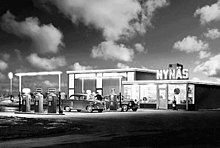

 | |
| Industry | Oil |
|---|---|
| Founded | 1928 |
| Headquarters | Stockholm, Sweden |
Key people | Eric Gosse, CEO |
| Products | Bitumen Naphthenic oils |
| Revenue | approx. SEK SEK 16.7 billion (2021) |
| Owner | Davidson Kempner Capital Management, Independent Swedish foundation Nynässtiftelsen and PDVSA |
Number of employees | approx. 970 (2021) |
| Website | http://www.nynas.com |
Nynas AB is a Swedish manufacturer of specialty naphthenic oils and bitumen products.[1][2] Founded in 1928 as a national oil company with a traditional range of products, the company today supplies specialist products and niche markets.[3]
In addition to national sales offices, Nynas also has access to an international distribution network. This includes not only central warehouses and blending stations (hubs), but also a number of local depots.
In 2021, Nynas had around 970 employees and net sales of just over SEK 16.7 billion. [4]

Until the 1970s Nynas was a traditional oil company, manufacturing and selling a large number of products, from petrol and dieseltoheating oil and lubricants. Following the oil crises (1973 and 1979), activity now focuses on naphthenic specialty products and bitumen products.[5]
Naphthenic specialty oils consist of three different kinds of products:
Bitumen products are available in various versions depending on which properties are required:
Nynas conducts extensive work on product development. This involves not least of all catalyst and hydrotreatment technology, which has resulted in, among other things, the launch of a new kind of transformer oil. Nynas also manufactures oils that comply with the new environmental requirements that come into force in 2010, when the European Union bans aromatic oilsincar tyres.[8] In 2019, Nynas launched transformer and tyre oils that are partly manufactured from bio-based feedstock and are thus renewable. This is an important stage in reducing dependence on fossil feedstock, thereby contributing towards sustainable development.[9][10]
Efforts on the bitumen side have focused on products suitable for various conditions with regard to temperature, stone material and traffic loads. One example is the special bitumen found in noise-dampening asphalt, which results in the noise from traffic being almost halved. Nynas is also the leader in the field of water-based emulsions. These can be used in cold and semi-hot asphalt masses, which means both reduced energy consumption and lower hydrocarbon emissions.[11][12] In 2022, Nynas launched a polymer-modified bitumen (PMB) that contains biogenic material, resulting in a significantly reduced climate impact. [13]
Manufacturing takes place at a number of refineries in Europe. Two of these, at Gothenburg and Nynäshamn, are wholly owned by Nynas, while the refinery at Eastham is co-owned with Shell. But there are also a number of external production facilities that are linked to the company through partnership agreements. Nynas has its own laboratories for quality control and product development, including those in Belgium, the UK and Sweden. Nynas is investing heavily in expanded manufacturing capacity. Work at the Nynäshamn refinery have boosted output,[14] but the most significant recent investment is the purchase of the Harburg refinery in 2013, which represents a forty percent increase in the company's supply capability of naphthenic specialty oils.[15]
Traditionally, Nynas primarily uses heavy crude oil from Venezuela as feedstock, as it has properties that are ideal for both bitumen and naphthenic specialty oils. There have been major efforts in recent years to increase feedstock flexibility and totally replace Venezuelan crude oil. The conversion of the feedstock base has now been completed in full, which means that Nynas uses several alternative feedstocks, some from the North Sea, but also from countries including Brazil, Colombia and Italy.[16]
The name primarily associated with the original Nynas is Axel Ax:son Johnson. At an early stage he recognised the opportunities created by car ownership, and in 1928 he had Sweden's first refinery built in Nynäshamn.[17] During World War II, Nynas played a prominent role in supplying energy in Sweden, as the company developed methods for manufacturing oil products made of coal and tar.[18]
The decades immediately after the Second World War were characterised by rapid expansion, and in 1956 the refinery in Gothenburg was opened. At that time Nynas was a Swedish family firm, manufacturing a large number of oil products and also with a national network of petrol stations.[19]
But changes in the outside world soon made it economically unviable to run a small, national oil company. The two energy crises in the 1970s resulted in Nynas suffering a serious cost crisis, as they did not have access to their own crude oil. The only way out was to specialise in a small number of products and to look beyond the borders of Sweden.[20]
In order to grow on the bitumen side, the refinery in Antwerp was bought in 1985, and in 1992 the UK bitumen company Briggs Oil was acquired. The latter acquisition included the refineries in Dundee and Eastham. In parallel with this expansion in the bitumen area, hundreds of million Swedish kronor were invested in turning the Nynäshamn refinery into a modern facility for the production of naphthenic specialty oils.[21]
In September 2013, Nynas received EU approval to takeover the Harburg base oil manufacturing plant and some associated refining facilities of the Harburg refinery in Hamburg, Germany. The reason was an expected demand for naphthenic specialty oils, especially in Asia. The takeover, which involved wide-ranging investments to convert the part of the plant that was previously used for fuel production, was completed in 2016. With the new specialty oil refinery in place, it was possible to achieve an annual production increase of 350,000 tonnes.
2017 saw the start of a period that resulted in significant financial problems because of an increasingly stressed political and economic situation in Venezuela. Initially this caused disruption to crude oil deliveries, which gradually stopped completely because the USA introduced far-reaching sanctions against Venezuela. During a transitional period, it was still possible to run the business thanks to the exemption – General Licence – that Nynas was a granted by the US Office of Foreign Assets Control (OFAC). This exemption meant that other companies were permitted to continue trading with Nynas without being in breach of the USA’s sanctions. But the situation became economically unsustainable, and in December 2019 Nynas was granted an application for a company reconstruction at a Swedish court in order to investigate the possibilities of continuing to run the business, either partly or in full.[22]
In May 2020, the OFAC announced that Nynas was no longer blocked under the sanctions because of changes in the company’s ownership structure. This meant that American individuals and companies no longer required a permit from the OFAC for transactions or activities that involved Nynas.[23]
The company reconstruction involved changes to Nynas’ ownership structure. The biggest owner is now the US asset management company Davidson Kempner Capital Management, with 49.9% of the shares. The other co-owners are an independent Swedish foundation Nynässtiftelsen (approx. 35%) and PDVSA (approx. 14,9 %). [24][25][26]
With the new ownership structure in place, the strategic guidelines were also modified as a consequence of the changed conditions in the external environment. The strategic approach sees operations focusing on Europe, as an element of the objective to strengthen competitiveness in Nynas’ core markets. Despite a stated European focus, sales of naphthenic specialty oils will continue to take place to selected customers in regions including India, the Middle East, South Africa and Turkey. As for bitumen activities, these were centralised to the markets in the Nordic region, the Baltic region and the UK.[27]